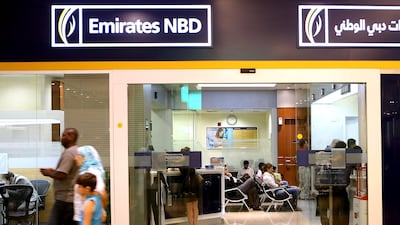Emirates NBD, the biggest lender by assets in Dubai, reported a 24 per cent year-on-year decline in its first quarter net income as it increased provisions for potential bad loans amid the coronavirus pandemic.
Net profit for three months to the end of March declined to Dh2.1 billion, the lender said in a statement to the Dubai Financial Market, where its shares trade.
While credit quality was stable in the first quarter of the year, Emirates NBD increased impairment allowances in recognition of a “potential deterioration” in credit quality in subsequent quarters related to the coronavirus pandemic, it said.
Total impairment charges for the reporting period increased more than three-fold to Dh2.56bn at the end of March 2019. Operating profit before impairments came in 46 per cent higher at Dh4.84bn, but fell 17 per cent year-on-year to Dh2.28bn after the charge for potential bad loans.
“The operating performance for the first quarter of 2020 was good, prior to the emergence of the economic impact of Covid-19 in March 2020,” Patrick Sullivan, group chief financial officer, said.
Regional banks are “facing multiple challenges” from low interest rates, low oil prices and lower economic growth due to disruption from the pandemic, he said.
“Emirates NBD has a good underlying operating performance, coupled with a robust balance sheet to help navigate these challenges. The group continues to operate with strong liquidity and healthy capital ratios.”
Lenders worldwide are facing a decline in profitability as loan growth slows and interest rates plunge due to the pandemic's disruption of the global economy. Last week, JPMorgan Chase, America's largest bank, reported a 69 per cent drop in first quarter profit, as it set aside $8.3bn for loan-loss provisions.
The global economy has slumped into the worst recession since the Great Depression of the 1930s. The International Monetary Fund last week projected a 3 per cent contraction in global output for 2020 and said the outlook for the world economy is worse than the 2008 global economic crisis.
The UAE, the second-biggest Arab economy, was the first in the Middle East and North Africa to roll out Dh282bn in fiscal and monetary support, providing zero interest funding to banks to boost lending growth in the country. In addition, the government implemented a variety of other initiatives that range from discounted utility bills to waivers of fees to buttress the economy.
Emirates NBD on Monday said its total income climbed 46 per cent to Dh6.88bn due to loan growth and higher fee income including its Turkish unit DenizBank. Net interest margin improved 19 basis points to 3.02 per cent, helped by the positive impact of DenizBank.
DenizBank, which is the fifth-largest private bank in Turkey, contributed total income of Dh2.25bn and net profit of Dh504m to the Group for the first three months of 2020.
Emirates NBD’s total assets at the end of the first quarter climbed to Dh691.7bn, up 1 per cent from the end of 2019, while loans also climbed by 1 per cent to Dh443bn for the period. Customer deposits remained steady at Dh467bn.
The bank’s non-performing loans ratio was stable at 5.5 per cent and its coverage ratio improved by 8.2 per cent to 120.5 per cent, the bank said. Common equity tier 1 ratio at 14.8 per cent was well above minimum regulatory requirements, it added.
Emirates NBD is among UAE banks that have rolled out support measures to help reduce financial stress for their clients.
Banks have extended relief to businesses and individuals, particularly in stressed sectors, through reduced costs and fees, loan deferrals, reduced interest rates and lower processing fees.
Earlier this week, the UAE Central Bank urged lenders to help individual borrowers as well as small and medium-sized enterprises to blunt the impact of the pandemic on the country’s economy. UAE lenders have so far tapped 30 per cent of a Dh50bn Targeted Economic Support Scheme facility and "are passing on these funds to their customers affected by the Covid-19 pandemic", governor Abdulhamid Saeed said on Sunday.


